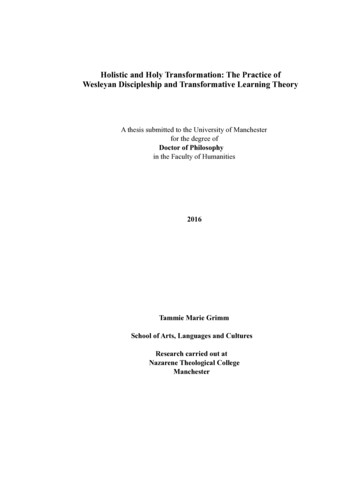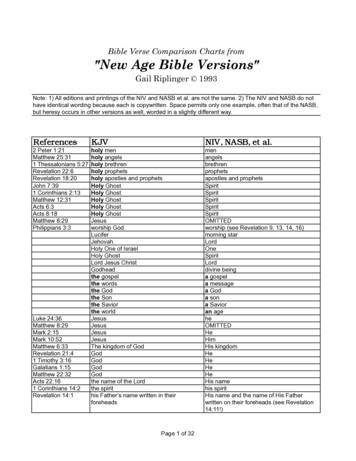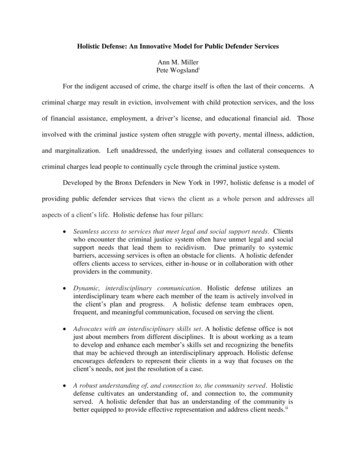
Transcription
Holistic and Holy Transformation: The Practice ofWesleyan Discipleship and Transformative Learning TheoryA thesis submitted to the University of Manchesterfor the degree ofDoctor of Philosophyin the Faculty of Humanities2016Tammie Marie GrimmSchool of Arts, Languages and CulturesResearch carried out atNazarene Theological CollegeManchester
ContentsChapter Outline 2Tables and Figures 6Abbreviations 7Abstract .8Declaration 9Copyright . .10Acknowledgements .11Chapter One: The Dilemma of Disciple Making . . 13Introduction . . 13The Need forTransformation . .13Classical Christian Discipleship .17Wesley’s Model of Discipleship . 20Transformative Learning Theory 24Methodology and Chapter Outline .27Chapter Two: Discipleship in Christian Education . . .33Introduction . .33United Methodist Christian Religious Educators . 35Other Methodist and Wesleyan Christian Educators .39Transformative Learning and Christian Education .45Conclusion .50!2
Chapter Three: The Practice of Wesleyan Discipleship . .52Introduction . .52Defining the Practice of Discipleship .52The Presence and Role of the telos .56The Presence and Role of Virtue . .58The Presence and Role of the ethos 60The Presence and Role of the Disciplines . 61Building a Framework for Wesleyan Discipleship . .63The Relationship of Virtues and Disciplines .64The Relationship of ethos and telos . 66The Construction of a Discipleship Matrix. . . .69Discipleship as Holy Transformation . . . .69The Process of Sanctification .69Divine Grace and Human Effort .76A Lifelong Endeavour . .79Conclusion .81Chapter Four: The Fragmentation of Discipleship . . . 83Introduction . .83Imbalances in the Transformed Life . 86Tending Towards Quietistic Traps .86Tending Towards Nominalistic Traps .89Tending Towards Legalistic Traps .92Tending Towards Antinomianistic Traps 94Partial Visions of the Transformed Life .97Tending Towards Pietistic Traps .98Tending Towards Enthusiastic Traps . .102Tending Towards Formalistic Traps . . 106Tending Towards Rationalistic Traps. .108Conclusion 111!3
Chapter Five: Transformative Learning Theory (TLT). . . 115Introduction . 115Adult Education 115Context for Learning .116Learning Theories . . . 120Transformative Learning. . . 123Defined . .123Philosophical Foundations . .124Core Components of TLT .126The Role of Experience . .126The Role of Critical Reflection . . 129The Role of Rational Discourse . 131Development of TLT . . .131The Initial Wave of the Theory. . .131The Integrity of a More Unified Theory . 133The Influence of Emancipatory Educators . 134The Inclusion of Extra-Rational Knowledge. . 136The Insight of a Planetary Worldview .143Identifying Growing Edges for Further Development . .145Conclusion . .146Chapter Six: The Practice of Wesleyan Discipleship and TLT in Dialogue .148Introduction . . .148Theological Reflection on TLT regarding the telos . . .148Theological Reflection on TLT regarding Virtue .153Theological Reflection on TLT regarding the Disciplines .157Theological Reflection on TLT regarding the ethos 163Conclusion . . 172!4
Chapter Seven: The Practice of Transformative Discipleship . .174Introduction . . .174Contributions of TLT to Wesleyan Discipleship .175The Role of a Discrepant Event . . 176The Role of Critical Reflection 180The Role of Rational Discourse 185The Coordinated Response . 188Contributions of Wesleyan Discipleship to TLT .191Non-formal and Informal Nature of Wesleyan Discipleship . 192The Presence of a Coherent telos 194Conclusion 198Chapter Eight: Christian Education as a Transformative Ministry . .199Introduction . 199Diagnosing the Situation. 199Confronting the Situation . . 202Conclusion 213Bibliography . . 216Final Word Count:74,614!5
Tables and FiguresFigure 1The Loci of the Discipleship Matrix . . .63Figure 2The Vertical Axis 66Figure 3The Horizontal Axis 67Figure 4The Centre of the Discipleship Matrix . .69Figure 5Quietistic Traps . .86Figure 6Nominalistic Traps . 89Figure 7Legalistic Traps . . 92Figure 8Antinomianistic Traps . . . 95Figure 9Pietistic Traps. . 98Figure 10Enthusiastic Traps .102Figure 11Formalistic Traps . 106Figure 12Rationalistic Traps 109Chart 1Types of Education . .116Figure 13The Discipleship Matrix and TLT . . 189Figure 14A Theory of Christian Transformation. . 205!6
AbbreviationsCEJChristian Education JournalRulesThe General Rules of the United SocietiesSDLSelf-Directed LearningTLTTransformative Learning TheoryUMCThe United Methodist ChurchWorksThe Bicentennial Edition of The Works of John Wesley (Nashville:Abingdon Press, 1984 -)WTJWesleyan Theological Journal!7
University of ManchesterTammie Marie GrimmDoctor of PhilosophyHolistic and Holy Transformation: The Practice ofWesleyan Discipleship and Transformative Learning Theory2016The subject of this thesis is the nature of Christian transformation asunderstood through the process of discipleship in the Wesleyan tradition and UnitedMethodism in particular. A basic premise is that contemporary discipleship effortsare perceived as ineffective in spite of the numerous strategies that exist within thefield of Christian education. The contention of this thesis is that the current situationis rooted in a failure to address the holistic and integrated nature of Christiantransformation, which from a Wesleyan perspective is understood as the process ofsanctification. This thesis explores a more holistic vision for discipleship, drawingupon methodology proposed by Richard Osmer to do theological reflection as itengages Wesleyan theology and transformative learning theory (TLT), acontemporary adult educational theory. The result is a contribution to the field ofChristian education that has implications for disciple making ministries in the localcongregation.Alasdair MacIntyre’s theory of practice is developed as a means ofaccounting for the present incoherence within discipleship ministries, and to resourcethe development of a more holistic approach to the process of Wesleyan discipleship.As a result, discipleship is conceived of as a single complex practice comprised offour inseparably related and integrally connected dimensions: virtues, disciplines,ethos and telos. The theoretical framework also provides insight into contemporarydiscipleship efforts by systematically isolating each component and investigating theparticular emphasis that is stressed, thus truncating the practice of discipleship.Putting this framework into conversation with TLT provides a way fortheological reflection that can broker a cross-disciplinary dialogue between TLT andWesleyan discipleship. The resulting discourse discerns which relevant aspects ofTLT can be appropriated within a Wesleyan context and how TLT contributes to thefield of Christian education. Contributions that Wesleyan discipleship can make tothe field of TLT are also explored.The thesis develops an educational theory that views discipleship as a singlecoherent complex practice that is consistent with the process of sanctification in theWesleyan tradition. Such a theory overcomes the current situation that results inisolating various discipleship efforts by prompting the field of Christian education toconsider discipleship as sanctification that transforms persons and their contexts inholistic ways.!8
DeclarationNo portion of the work referred to in the thesis has been submitted in support of anapplication for another degree or qualification of this or any other university or otherinstitute of learning.!9
Copyright StatementI.The author of this thesis (including the appendices and/or schedules to thisthesis) owns certain copyright or related rights in it (the “Copyright”) and shehas given The University of Manchester certain rights to use such Copyright,including for administrative purposes.II. Copies of this thesis, either in full or in extracts and whether in hard or electroniccopy, may be made only in accordance with the Copyright, Designs and PatentsAct 1988 (as amended) and regulations issued under it or, where appropriate, inaccordance with licensing agreements which the University has from time totime. This page must form part of any such copies made.III. The ownership of certain Copyrights, patents, delights, trade marks and otherintellectual property (the “Intellectual Property”) and any reductions of copyrightworks in the thesis, for example graphs and tables (“Reproductions”), which maybe described in this thesis, may not be owned by the author and may be ownedby third parties. Such Intellectual Property and Reproductions cannot and mustnot be made available without the prior written permission of the owner(s) of therelevant Intellectual Property and/or Reproductions.IV. Further information on the conditions under which disclosure, publication andcommercialisation of this thesis, the Copyright and any Intellectual Property and/or Reproductions described in it may take place is available in the University IPPolicy (see ocID 487), inany relevant Thesis restriction declarations deposited in the University Library,The University’s Library’s regulations (see ons) and in The University’s policy on Presentation of Theses.!10
AcknowledgementsThe opportunity to express my appreciation and recognition to those whohave contributed to my well-being during the research and writing of this doctoralthesis is both gratifying and daunting. Gratifying because saying ‘thank you’means I have arrived at a point that has been a long time coming and dauntingbecause I run the risk of neglecting to name someone or of being so profuse thatmy thankfulness appears diluted. Nevertheless, here goes!To the holy Trinity, the sovereign God of creation, you are the one thatinspired this project within me. Though the route has been far more circuitous thanI could have possibly imagined, you consistently provided a way forward. I giveyou thanks for the following people and communities you have blessed me withduring throughout this endeavour:- For my family—immediate, extended, and even fictive kinfolk, bothnear and far—but especially my parents for their unwavering support,love, prayers and encouragement to take the dog on rambles in the fieldsand woods.- For Phil Meadows and his obedience to the movement of God and takingon both me and this project. I still marvel at how an initial meetingbecame a two-hour conversation in which he breathed life into my halfextinguished hopes, and handed back to me what has worked out to bethe project I wanted to write in the first place.- For Drs. Mark Maddix, Peter Rae and Joseph Wood, my examiners whooffered constructive criticism in a firm but gentle manner to help meimprove this work.- For A Foundation for Theological Education for being there at a criticaljuncture to help me bridge programs successfully. Special thanks go toPaul Ervin, Steve Moore and Tom Albin for their unconditionalacceptance and calm, faith-filled assurance regarding a way forward. Andfor the John Wesley Fellows for being the supportive and nurturingfellowship they were created to be.- For First United Methodist Church of Washington, North Carolina andRev. Ray Whitman and their commitment to support candidates for!11
ordained ministry who are also pursuing academic credentials.- For Barbara and Jim Holsinger and their clan, with specialappreciation to Sarah for her obedience to the Holy Spirit to think to see ifI was willing to sojourn to Hope Valley. I was—and am forever blessed asa result.- For Alice, Alicia, Amie, Angela, Brian, Cindy, Chuck, Gray, Joy, Josh,Lorraine, Susanna, Tom and Tracey who live on the other end of mymobile phone.- For the congregations who have nurtured, encouraged and challenged mealong this discipleship journey; from Dunellen to Oldwick, to FUMCLexington, to St. James, Resurrection and especially to Sergeantsville forpraying me through.- For my colleagues, whether they reside in the church or the academy (orboth!). There are simply too many to name whom I count as friends andhave been conversation partners over the years, but particular gratitudegoes to Ken Brewer and Rev. Mike McKay who hosted my firstexperiences in Wesleyan small groups, and to Bishops Al Gwinn andHope Morgan Ward who saw no inconsistency in a deacon pursuing adoctoral degree. And especially for my residency group (colleagues andleaders—in both North Carolina and New Jersey!) as well as for theordained and lay folk in Kentucky, North Carolina, Virginia, New Jerseyand those scattered around the globe.- For the communities I discovered at Cliff College and NazareneTheological College of the University of Manchester who accepted meand made me feel immediately at home in their midst.- For all who encouraged me, who spoke wisdom, offered counsel, andgave solace, whether they provided me a night’s lodging, a meal, sent mea note, text or phone call of encouragement, and most importantly, offeredprayer on my behalf that I might see this project to completion. May we,by your good grace, Lord, and through the power of the Holy Spirit,continue to grow in grace and knowledge of Jesus Christ for the goodnessof your Kingdom in this world.!12
Chapter OneThe Dilemma of Disciple MakingIntroductionThe intent of this thesis is to examine the nature of discipleship in theWesleyan tradition and to understand how transformative learning theory (TLT), afield in contemporary adult education, might be engaged in dialogue to viewdiscipleship as a single, complex practice and all-encompassing endeavour that hasimplications for congregations. The thesis concerns itself with discipleship efforts inthe field of Christian education within The United Methodist Church in NorthAmerica yet has implications for the broader Wesleyan tradition. The thesis beginswith the premise that, despite efforts through numerous strategies and programmes,there is a failure within United Methodism to adequately nurture and encourage adultdisciples in Christian transformation in holistic ways. The thesis arguescontemporary voices within the field of Christian education may advocate for aWesleyan understanding of discipleship and some may even employ transformativelearning theory (TLT) in their efforts, but they ultimately fail to offer a coherentunderstanding of what discipleship entails. The thesis locates discipleship as thecentral practice and comprehensive lifelong endeavour of the Christian life. It arguesChristian discipleship implicitly inspires transformation when understood asconsistent with the process of sanctification in the Wesleyan tradition. Furthermore,the thesis engages a cross-disciplinary dialogue between educational ministriesassociated with discipleship and TLT in order to suggest appropriate learningprinciples in such a manner to address the present situation.The Need for TransformationThe mission of The United Methodist Church, an inheritor of John Wesley’smovement, is ‘to make disciples of Jesus Christ for the transformation of the world,’which is grounded in scriptural authority of the Great Commission in Matthew28:18-20.1 As a denomination, the UMC views the local congregation as the primarylocation through which persons come to saving knowledge of Jesus Christ,1 The United Methodist Church, The Book of Discipline of The United Methodist Church(Nashville: The United Methodist Publishing House, 2012), 91.!13
committing their lives to follow Jesus’ command to love God and neighbour and beagents of God’s grace, inaugurating social structures consistent with God’s Kingdomin the world. The denomination’s Book of Discipline defines discipleship as ‘faithfulmembership in the local church [which] is essential for personal growth and fordeveloping a deeper commitment to the will and grace of God.’2 However, acomprehensive denominational study commissioned in 2009 and conducted in 2010by global research analysts Towers Watson indicates eighty-five percent of UnitedMethodist congregations in the United States struggle in the mandate to be faithfuldisciples who make more disciples. These congregations are considered of low ormedium vitality. 3 In 2013, according to the UMC’s General Council on Finance andAdministration, more than seventy percent of local congregations did not baptiseanyone age thirteen or older, fifty-five percent did not baptise anyone age twelve orunder and fifty percent of congregations did not experience any profession of faith.4United Methodist Bishop Scott Jones decries the casual attitude that fosters thismalaise within congregations, likening the Christian life to membership in a civicclub or organisation. He charges that new converts to faith ‘either explicitly or by23Book of Discipline, 91.The Towers Watson study and resultant report was sponsored by The Call to Action SteeringTeam commissioned by the Council of Bishops and the denomination’s Connectional Table. Thepurpose was to determine ‘clear, data-supported information about vital congregations’ by datamining and evaluating the ‘millions and millions of data-points generated by the year-end reportssubmitted by U.S. UM congregations each year.’ In order to identify highly vital congregations,Towers Watson developed a ‘vitality index’ that considered three primary factors: attendance, growthand engagement in order to evaluate the vitality of a given congregation. A methodology ofregression-analysis identified one hundred twenty-seven drivers or elements, sixteen of which weredetermined to be significant factors in highly vital congregations as opposed to medium and lowvitality congregations. Of the thirty-two thousand, two hundred and twenty-eight congregationsproviding data, four thousand nine hundred sixty-one congregations or fifteen percent of thecongregations were assessed as highly vital. Of the remaining eighty-five percent of churches, fortynine percent were medium vital and thirty-six percent were low vital. Amy Valdez-Barker, Appendixin Vital: Churches, Changing Communities and the World by Jorge Acevedo (Nashville: AbingdonPress, 2012), 133-137. For more information on the reports and their findings see The Call to n to access the Steering Team Report at http://s3.amazonaws.com/Website tion-steering-teamreport.pdf and the Congregational Vitality Towers Watson Report at http://s3.amazonaws.com/Website ith-appendices.pdf (accessed 25 April 2015).4 In an effort to ‘renew focus on discipleship,’ Discipling Ministries created One MattersDiscipleship Award in April 2015. Sara Thomas, Deputy General Secretary of DiscipleshipMinistries and Chief Strategist for Vital Congregations states, ‘With the One Matters DiscipleshipAward, we want to lift up the importance of discipleship and help interpret across the connectionwhat zeros in professions of faith and baptism mean and what moving away from the zeros means,’in ‘One Matters Award to Encourage Baptisms and Professions of Faith’ entry posted 17 April -of-faith (accessed 25 April 2015).!14
example’ are taught that the Christian life insists on nothing more than passive,optional participation, asking only for occasional attendance, casual giving andallowing persons to behave ‘as they please.’ 5 Additional research conducted by TheBarna Group, an organisation that makes no denominational distinctions as it studiesreligion across the United States, indicated that while forty-four percent of Americanadults self-identify as Christians, only five percent of American Christians reporttheir lives are significantly changed as a result of their Christian faith.6 Anypossibility of United Methodists contributing to the transformation of the worldappears to be stymied despite the importance placed on discipleship and disciplemaking efforts.Compounding the issue facing discipleship is that when discipleship is notequated with faithful membership within a local congregation, it is described as a listof activities consistent with the General Rule of Discipleship, ‘to witness to JesusChrist in the world, and follow his teachings through acts of compassion, justice,worship, and devotion, under the guidance of the Holy Spirit.’ 7 A host ofprogrammes, courses and workshops in Christian education and spiritual formationfoster and nurture these acts of compassion, justice, worship and devotion isdeveloped regularly and are offered as discipleship initiatives within many UMcongregations. The denomination has created an agency, Discipleship Ministries,which is devoted to offering ministries in the areas of leadership, new church starts,congregational development, spiritual formation and other niche ministriesspecialised by age, gender and ethnicity. 8 For United Methodists, there areprogrammes within the denomination designed for nearly every demographic toeducate and replicate more disciples.9 Such programmes target a specificdemographic on a given topic, usually meeting in groups for as little as a few hours5 Scott J. Jones, ‘Teaching the United Methodist Way,’ in The Future of the United MethodistChurch: Seven Vision Pathways, ed. Scott J. Jones and Bruce R. Ough (Nashville: Abingdon Press,2010), 40.6 George Barna, Maximum Faith: Live Like Jesus (Ventura, CA: Metaformation, 2011), 25.7 Book of Discipline, 596-7.8 A non-exhaustive list of ministries can be found on the Discipleship Ministries website under‘Worship,’ ‘Leadership Resources,’ ‘New Church Starts’ and ‘International Ministries’ at http://www.umcdiscipleship.org (accessed 20 August 2015).9 Cokesbury, a division of the United Methodist Publishing House, retails curriculum from acrossthe denomination and also includes other Christian resources for the wider Christian tradition.Categories for whom materials are targeted include ‘Adults,’ ‘Youth,’ ‘Tweens,’ ‘Children,’‘Multiage’ and ‘Multicultural’ at https://www.cokesbury.com (accessed 10 February 2016).!15
or as long as several weeks, or in some cases, months. 10 Church programmes anddenominational initiatives are well intentioned and address a wide range of particularaspects of the Christian life, but participation in such does not ensure disciplesexperience the kind of transformation that has an impact in their lives or on the livesof others.When understood as a programme, discipleship becomes a particularisedministry competing alongside the other committees and activities of the church.Often, discipleship is equated with disciple making, and the necessity of being adisciple in all avenues and areas of life is overlooked. United Methodist Bishop AlGwinn laments, ‘the churches of the Western world have not made discipleship acondition of being a Christian.’11 Bishop Hee Soo Jung cautions, ‘No one is able todevelop a disciple without first engaging in the process of becoming a disciplehimself or herself.’ 12 Both are adamant that discipleship involves adopting theposture of being a follower of Jesus and learning what it means to become like Christif there is any hope to fulfil The Great Commission or the denominational mission.Furthermore, regional strategist for the Baltimore-Washington Annual Conference10 E.g. Grace Bradford, Guide for Class Leaders: A Model for Christian Formation (Nashville:Discipleship Resources, 1999); Stephen D. Bryant, Janice T. Grana and Margorie J. Thompson,Companions in Christ: A Small-Group Experience in Spiritual Formation (Nashville: Upper RoomBooks, 2001); Teresa Gilbert, Patty Johansen, Ray Regennitter and John P. Gilbert, Charting theCourse: A Workbook on Christian Discipleship (Nashville: Discipleship Resources, 2007); James A.Harnish and Justin Larosa, A Disciple’s Heart:Growing in Love and Grace (Nashville: AbingdonPress, 2015); Rueben P. Job, Three Simple Rules: A Wesleyan Way of Living (Nashville: AbingdonPress, 2007); Scott J. Jones, The Wesleyan Way: A Faith that Matters (Nashville: Abingdon Press,2013); J. Ellsworth Kalas, Christian Believer: Knowing God with Heart and Mind(Nashville:Abingdon Press, 2001); Leander E. Keck, Jesus in the Gospels: DISCIPLE SecondGeneration Studies (Nashville: Abingdon Press, 2003); Carol F. Krau, Thomas R. Hawkins,MaryJane Pierce Norton, Barbara Bruce, Susan W.N. Ruach and William Pyatt, A Faithful Future:Teaching and Learning for Discipleship Volume 2 (Nashville: Discipleship Resources, 2003); CarolF. Krau, Judith M. Bunyi, N. Lynne Wasted, Joyce Brown, Barbara Bruce and Ben Marshall, AFaithful Future: Teaching and Learning for Discipleship (Nashville: Discipleship Resources, 1999);Jessica LaGrone, Namesake: Where God Rewrites Your Story (Nashville: Abingdon Women, 2013);Kimberly Dunnam Reisman, The Christ Centred Woman: Finding Balance in a World of Extremes(Nashville: Abingdon Press, 2013); Mike Slaughter, Change the World: Recovering the Message andMission of Jesus (Nashville: Abingdon Press, 2010); Gayle Turner Watson, Guide for CovenantDiscipleship Groups (Nashville: Discipleship Resources, 2000); Kevin M. Watson, The ClassMeeting: Reclaiming a Forgotten (and Essential) Small Group Experience (Nashville: SeedbedPublishing, 2013); Richard Byrd Wilke and Julia Kitchens Wilke, DISCIPLE: Becoming DisciplesThrough Bible Study (Nashville: Abingdon Press, 1993).11 In his annual State of the Church Address, on 10 June 2010, Bishop Alfred Gwinn addressed theNorth Carolina Annual Conference of the UMC exhorting members of conference to get back to theirprimary call to be disciples in order to fulfil the Great Commission. Video available at https://vimeo.com/12494982 (accessed 18 October 2010). Discussion of the general state of discipleshipoccurs between minutes 9:00 and 14:45.12 Hee-Soo Jung, ‘Strengthening Clergy and Lay Leadership,’ in Jones and Ough, 47.!16
Christie Latona asserts those ‘struggling to make disciples within the UMC lack afoundational discipling culture’ and insists that a structural solution cannot solve a‘spiritual crisis.’13Jones suggests a necessary cohesion between being a Christian and doingChristian things should exist within the varied and expansive numbers ofprogrammes when he states, ‘Christian discipleship is a many-faceted way of life.’14Christian discipleship is to participate in an integrated, holistic way of life thatidentifies participants as disciples of Jesus Christ. However, the wealth ofprogramming designed to reproduce disciples in a variety of shapes, sizes andfeatures, does not necessarily consider discipleship as a condition, or a way of life.Data collected by The Barna Group indicates forty percent of self-describedAmerican Christians participate in a regular Bible study and only eighteen percentsay they are totally committed to their spiritual development as Christians. 15 Theemphasis on programmes often misleads people into believing that discipleship andthe making of disciples is reserved for persons who are trained to do so, or as Jonespoints out, only an option for lay persons who have available time in their alreadycrowded schedules. The best available data supports the widespread notion withinthe denomination that transformation—personal or social—is not a significant factorin contemporary congregations.Classical Christian DiscipleshipSince Jesus proclaimed the Great Commission, a major task of the Church’sministry has been devoted to cultivate Christian living for participants who eitherseek to become Christian or who are already committed to Christianity. In UnitedMethodism, this has been addressed through the field of Christian education. Twopractical theologians in the Wesleyan tradition, Dean Blevins and Mark Maddix,discuss the inherent and longstanding connection between discipleship andeducation:13Christie Latona, ‘Disciple Multiplication is the Main Thing,’ ministrymatters.com entry posted10 February 2014 under Circuit Rider (February/March/April 2014) iple-multiplication-is-the-main-thing (accessed 25April 2015).14 Jones, ‘Teaching the United Methodist Way,’ 36.15 Barna, Maximum Faith, 39-41.!17
Didache, the Greek term for teaching, serves as a conceptual framework fordiscipleship th
Wesleyan Discipleship and Transformative Learning Theory 2016 The subject of this thesis is the nature of Christian transformation as understood through the process of discipleship in the Wesleyan tradition and United Methodism in particular. A basic premise i










